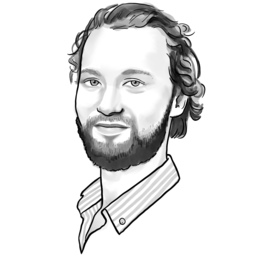
LinkedIn: convenient networking platform or stronghold of performance anxiety?
The UvA encourages the use of LinkedIn, but students experience stress from the networking platform. “It creates pressure when I see the curricula of fellow students.”
Instagram was already there, WhatsApp likewise, and TikTok is on the rise. But networking platform LinkedIn - originally aimed at professionals - is also stealthily taking an increasingly important role in students’ lives. A good thing, the UvA seems to think, which recently labeled the proper use of LinkedIn one of the “UvA career skills”: skills that would benefit students' career development.
The university organized two LinkedIn workshops this month as part of UvA Career Week. In addition, free professional profile photos were taken so UvA students could leave a “great first impression” with companies and recruiters on LinkedIn. Why is this necessary, according to the UvA?
“Having a good LinkedIn profile can greatly improve your standing with recruiters and motivate potential employers to contact you with a job opportunity,” the description of the application reads.
There was plenty of interest. Some 590 students signed up to get a LinkedIn profile photo, leaving only seven spots. The workshops were also well attended. Can we say that UvA students are undividedly positive about (the increasing importance of) the networking platform?
.jpg)
Working at Apple
“Dear Network, I am proud to announce that I have completed my studies cum laude and have been hired at Apple (and perhaps more importantly, you have not!).”
That, in a nutshell, is how we experience LinkedIn, Mohamed Saadettin jests. Next to him, Bruno Sotik nods in agreement. Both are pursuing a research master's in Communication Science at the UvA and do not hide their opinions about the social networking platform.
“Instagram is for people who want to show they are going to Ibiza,” Saadettin says. “LinkedIn is for people who want to show they’ve landed a great job. It’s a place where people exaggerate and brag about their positions.”
Master’s student in Public International Law Maëlys des Hays de Gassart, on the other hand, finds LinkedIn especially useful, she says. “It's useful for when you're looking for a job or internship, when you want to expand your network, or to see what others are doing or going to do.”
But that can also create pressure, she acknowledges, for example, when she “sees the curricula of fellow students on LinkedIn. They are often very impressive; people do internships at the United Nations or the International Court of Justice, for example.”
Comparing yourself with others
It is a well-known danger of social media, according to Ine Beyens, associate professor at the Amsterdam School of Communication Research. “Adolescence is pre-eminently a period when the tendency to compare yourself with others (mainly peers) is high. As many as 41 percent of young people sometimes or often compare themselves to others on social media, which are ideally suited for this,” Beyens said.
“Young people may feel jealous, insecure, or depressed as a result,” she continued. “About 20 percent of the adolescents in my study reported feeling this way.”
Adolescents can also experience stress and pressure from the near-constant presence of social media, Beyens explains. For example, in the form of fear of missing out (FOMO) - the stress you feel as a result of others doing fun things that you are not involved in. Positive feelings, such as sympathizing with others and getting inspired on social media, nevertheless predominate among adolescents, Beyens argues.
Remarkably, LinkedIn has long since ceased to be used only for sharing great achievements in work and study. Personal stories, such as pregnancies, also appear on the networking platform, newspaper NRC recently reported. Or giving guest lectures, having great conversations, and doing administration.
Saadettin recognizes that. “People nowadays create a social media version of themselves on LinkedIn. To what extent you feel pressure from that is partly up to you. You shouldn’t forget: you could have shared everything, for example, when you got your job or promotion, but you chose not to. That doesn't mean you do it less. Other people just chose to brag a little.”
Plugging cables as a data analyst
And besides, says fellow student Bruno Sotik, how reliable is all the information on LinkedIn? “Some people work at McDonalds’ and then state on LinkedIn, ‘I conduct transactions for a billion-dollar company’ - as if they were the owner.”
Sotik saw it the other day with a friend of his, who works at UvA as a teaching assistant in big data analytics. That all got him job requests via LinkedIn. “But what he doesn't mention on the platform is that all he does is canvas pages and plug cables,” Sotik says. “So in reality, his function has nothing to do with analyzing mass data.”
But there is also a clear benefit in that for the platform's user. Saadettin puts it into perspective. “LinkedIn is a great way to sell yourself if you don’t have much experience,” he explains. “It can connect you with people who in real life wouldn't stop to talk to you.”

Inactive status
Other students see having little experience as a reason not to use LinkedIn (temporarily). Boris Mark, for example, has put his LinkedIn on inactive while he is still studying law at the UvA, he says on one of the red couches in REC-A. “First you have to be able to put something relevant on there.” Until then, it's better not to have an account, he believes.
Within his law school, he sees many people with “slick LinkedIn accounts.” That can indeed create pressure for other students, Mark thinks, who he says is not bothered by it himself.
“The platform is especially important if you want to work in the commercial business world. A lot of the recruiters there get their people from LinkedIn.” But a “slick LinkedIn account” is not necessary, Mark knows: “I was hired for a great job without a LinkedIn page.”

